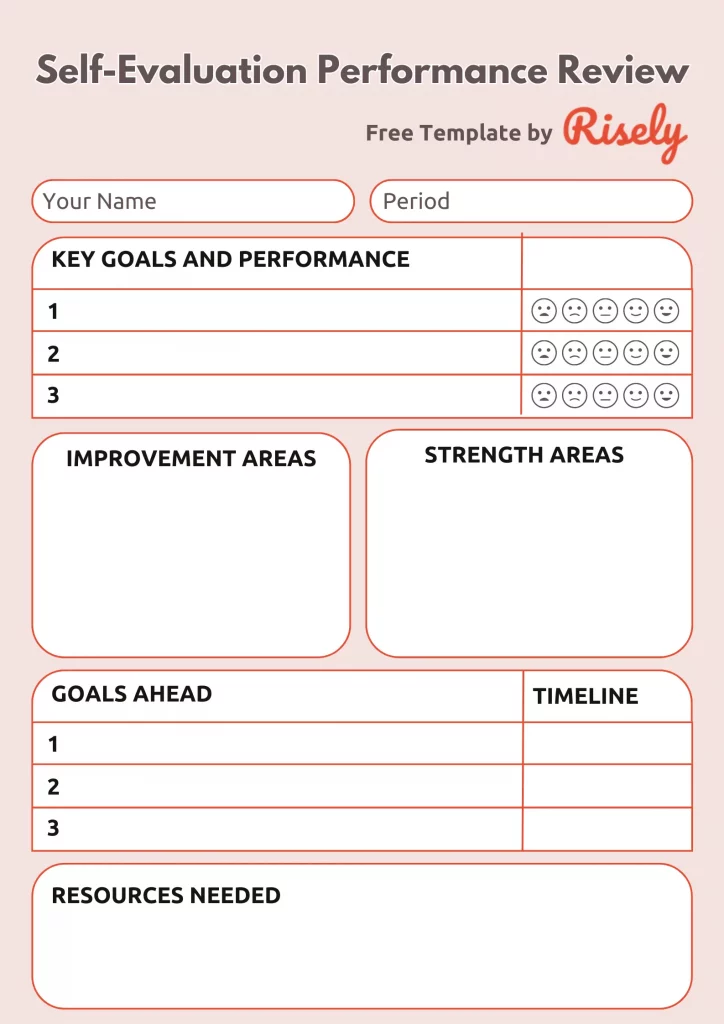How to do a Self-evaluation in Performance Reviews? (With 7 Examples)
Performance reviews can be a daunting experience for both managers and employees. Self-evaluation is an integral part of these reviews, allowing employees to reflect on their performance and set goals for improvement. In this blog, we will discuss self-evaluation and its importance for managers and employees. We will also provide a step-by-step guide on conducting self-evaluation and best practices to follow during the process. Additionally, we will provide seven examples of self-evaluations in performance reviews, covering various skills such as leadership, problem-solving, productivity, and communication. Lastly, we will highlight common pitfalls to avoid while conducting self-evaluations. By the end of this blog, you will clearly understand how to conduct effective self-evaluations that lead to better performance outcomes.- How to do a Self-evaluation in Performance Reviews? (With 7 Examples)
- Understanding Self-Evaluation in Performance Reviews
- How to Conduct a Self-Evaluation?
- Best Practices for Conducting Self-Evaluation in Performance Reviews
- Self-Evaluation in Performance Reviews Examples for Managers and Teams
- Self-Evaluation in Performance Reviews – Free Template!
- Common Mistakes to Avoid in Self-Evaluation
- Conclusion
- Other Related Blogs
Understanding Self-Evaluation in Performance Reviews
Self-evaluation in performance reviews allows employees to reflect on their own performance, assess their strengths and areas for improvement, and promote self-awareness and accountability. It also enhances communication between employees and managers, improving overall performance. By taking the time to evaluate their progress, employees can identify areas where they have excelled and need to make adjustments. This process allows for a mindset of continuous improvement, encouraging employees to set goals and strive for progression. Additionally, self-evaluation can help align individual achievements with organizational goals, ensuring that employees are working toward the company’s best interests. Overall, self-evaluation is an excellent opportunity for employees to showcase their professionalism, receive valuable feedback, and make meaningful contributions to their teams and organizations.What is Self Evaluation?
Self-evaluation is a crucial process where employees assess their job performance. It involves reflecting on accomplishments, challenges, and areas of improvement using specific examples and metrics. It helps employees take ownership of their professional development and is a starting point for performance discussions.Importance of Self-Evaluation for Managers
Self-evaluation plays a crucial role for managers in performance reviews. It not only empowers their team members to take part in the performance review process, it also brings some benefits listed below:- Self-evaluation aids managers in assessing employee performance comprehensively and identifying areas for improvement.
- It fosters open and honest communication, promoting collaboration within the organization.
- Self-evaluation informs decision-making and ensures alignment with organizational goals during performance reviews.
Importance of Self-Evaluation for Employees
On the other side of the table, there are some unique benefits of self-evaluations during performance reviews that employees achieve, such as:- Self-evaluation empowers employees to control their performance, showcasing achievements and growth.
- It encourages self-reflection, helping employees identify areas for improvement and set goals.
- Self-evaluation cultivates ownership, accountability, and alignment with organizational goals.
How to Conduct a Self-Evaluation?
- Start by thoroughly reviewing your job responsibilities and performance goals. Reflect on both your accomplishments and the challenges you faced throughout the evaluation period.
- Next, gather feedback from colleagues, supervisors, and clients to gain different perspectives on your performance. When writing your self-evaluation, use specific examples and provide concrete numbers to support your claims.
- Finally, identify actionable steps for professional growth and development based on your evaluation. This process of self-reflection and goal-setting is essential for continued progression in your career.
Self-evaluation Review Questions to Ask Yourself
Your self-evaluation questions will guide you toward your goals for the next performance period. Hence, a key fact to remember is that your questions should broadly cover all the areas relevant to your role. It can include the requisite hard and soft skills, growth opportunities, career aspirations, team goals, etc. A few examples of self-evaluation review questions are listed below to help you out:- What were your most significant accomplishments and achievements during the review period?
- How did your contributions positively impact the team or organization?
- How have you leveraged your strengths to benefit your team or department?
- What performance areas do you believe need improvement or further development?
- Have any challenges or obstacles hindered your performance, and how did you address them?
- What are your plans for continued professional development in the future?
- On a scale of 1 to 10, how would you rate your overall performance during this review period?
- What are your main takeaways from this self-evaluation, and what actions will you take to improve in the upcoming period?
- Find more here: Questions To Ask And Never Ask : A Comprehensive Guide On Performance Reviews
Other Interesting Reads
Best Practices for Conducting Self-Evaluation in Performance Reviews
Setting Goals and Objectives
When setting goals and objectives for a performance review, it is vital to be strategic and thoughtful. One practical approach is to set SMART (Specific, Measurable, Achievable, Relevant, Time-bound) goals aligning with organizational and personal development aspirations. It is also crucial to consider past performance, feedback received, and growth opportunities. Breaking down larger goals into smaller, actionable tasks can enhance time management and increase the likelihood of success. Regularly reviewing and updating plans throughout the performance period allows flexibility and progression. Individual contributors can strive to do their best work and contribute to the team’s success by setting meaningful goals.Gathering Relevant Data and Feedback
Gathering relevant data and feedback is crucial to ensure a comprehensive performance review. Seek input from supervisors, peers, and other stakeholders, as their perspectives can provide valuable insights. Use performance management tools or systems to track your progress and collect concrete numbers, metrics, and examples supporting your self-evaluation. Reflect on positive and constructive feedback received, considering multiple perspectives to understand your performance better. By gathering and analyzing data and feedback, team members can identify areas of improvement and make informed decisions about their professional growth.hBeing Honest and Objective
Being honest and objective is crucial when conducting a self-evaluation. It’s essential to assess your performance objectively, focusing on facts rather than emotions. Take the time to acknowledge areas where improvement is needed without being overly critical. Additionally, it’s essential to recognize and celebrate your achievements and successes. Utilize self-awareness and self-reflection to provide an accurate evaluation. Adopting this mindset allows you to evaluate your performance and strive for continual progression.Identifying Strengths and Weaknesses
Identifying strengths and weaknesses is crucial for self-evaluation in performance reviews. Start by recognizing your key strengths and their impact on your job performance. Highlight areas where you excel and have achieved notable results. It’s also essential to acknowledge weaknesses or areas that require improvement. Once you’ve identified these, focus on strategies and resources to address them and enhance your performance. You can grow professionally and progress significantly towards organizational goals by leveraging your strengths and addressing weaknesses. Are you feeling confused about your skills? Worry not! Because Risely has got you covered with free leadership skill assessments. Be it effective communication or your unintentional habit of micromanaging teams, we can help you evaluate your abilities in just a few minutes (did we mention free?) Head over here to get started – Leadership Skill AssessmentsDeveloping an Action Plan for Improvement
Team members need to identify areas requiring attention to start taking action. It can be done through self-reflection and seeking feedback from fellow team members. Once these areas are identified, setting realistic and measurable action items to address them effectively is essential. Prioritizing these action items based on their impact on job performance is crucial. Seeking guidance from mentors or supervisors through coaching can provide valuable insights and direction. Monitoring progress and reassessing regularly ensures that improvement goals are being achieved efficiently. Read more: How to Create Strong Individual Development Plans (With Examples)Self-Evaluation in Performance Reviews Examples for Managers and Teams
Reflecting on your leadership skills is essential during a self-evaluation. Quantify your accomplishments with concrete numbers, showcasing your ability to lead and inspire others. Effective collaboration with team members is another crucial aspect to highlight. Share success stories demonstrating your ability to work well with others and achieve collective goals. Problem-solving skills are highly valued in performance reviews, so provide specific examples of challenges you’ve successfully overcome.Example 1 – Leadership Skills
Demonstrating strong leadership skills, I successfully led a cross-functional team. I supported my team members’ professional growth through coaching and mentoring, utilizing emotional intelligence to resolve conflicts and foster a positive team spirit. Implementing new ideas and best practices, I improved the team’s performance. The positive feedback from team members and superiors validates my leadership capabilities. I achieved significant milestones by incorporating time management and a growth mindset into my approach.Example 2 – Team Collaboration Skills
Collaborating effectively with diverse team members to achieve common goals is crucial to successful teamwork. Participating in team meetings and contributing valuable insights and suggestions showcases strong collaboration skills. Fostering a sense of teamwork and cooperation among team members creates a positive working environment. Demonstrating strong communication skills ensures effective information sharing and keeps the team aligned. Developing and maintaining positive working relationships with colleagues promotes a harmonious work atmosphere.Example 3 – Problem-Solving Skills
When confronted with complex problems, I analyze the root causes and implement effective solutions, showcasing my problem-solving skills. I demonstrate critical thinking by evaluating alternative solutions and using data and evidence to support my decision-making process. Collaborating with cross-functional teams, I engage in brainstorming sessions to generate innovative solutions. With a proactive mindset, I overcome challenges and adapt to changing circumstances, achieving positive outcomes. My problem-solving abilities are instrumental in progressing toward organizational goals and finding new ways to tackle obstacles. It presents an excellent opportunity for growth and showcases my professionalism.Example 4 – Productivity Skills
I consistently manage my time effectively, ensuring I meet deadlines for assigned tasks and projects. Prioritizing tasks has become second nature, allowing me to focus on the most critical and urgent responsibilities. I use technology and tools effectively to enhance productivity and reduce manual tasks, adapting to the demands of today’s digital age. Incorporating these productivity skills not only benefits me personally but also contributes significantly to the overall success of our team and the achievement of organizational goals. I remain committed to further refining and enhancing my productivity skills to continue contributing to the team’s success.Example 5 – Achieving KPIs
I consistently exceeded key performance indicators (KPIs) to achieve exceptional results. Setting challenging yet attainable goals aligned with organizational objectives ensured progress toward KPI achievement. Regular monitoring allowed for necessary adjustments along the way. Collaboration with team members was crucial in leveraging their expertise and resources to reach our KPIs. I implemented innovative strategies and adopted best practices to drive performance improvement and generate results. This approach helped me meet my targets and contributed to the overall success of the team and the organization.Example 6 – Initiative and Innovation Skills
In my self-assessment of my innovation and initiative skills, I’ve experienced successes and areas where improvement is needed. I’ve demonstrated creativity by proposing novel solutions to challenges, positively impacting our team’s performance. My willingness to take on new responsibilities and adapt to changing situations has contributed to our team’s ability to meet evolving demands. There have been instances where I hesitated to propose new ideas or solutions, fearing potential rejection or pushback from colleagues. I can sometimes be overly cautious, which has prevented me from taking more significant risks in my work. I view these areas for improvement as opportunities for growth. I aim to build on my successes while addressing these challenges. I plan to foster a more open and risk-tolerant mindset, embracing the value of learning from failures and setbacks.Example 7 – Communication Skills
Improved communication with team members for seamless collaboration has been my priority. I have effectively communicated through clear and concise emails, ensuring that all relevant information is conveyed accurately. During team meetings, I actively listen and provide constructive feedback to contribute to the overall discussion. However, I sometimes feel unable to adapt my communication style according to the situation. Hence, that will be a focus area I will work on moving forward. Additionally, I use active questioning techniques to enhance understanding in conversations. I have fostered more robust relationships with my co-workers by implementing these communication strategies, leading to better teamwork and overall performance.Self-Evaluation in Performance Reviews – Free Template!

Common Mistakes to Avoid in Self-Evaluation
Overconfidence and Under-confidence
Finding the right balance is crucial in self-evaluation in performance reviews. It’s essential to avoid both overconfidence and underconfidence. By recognizing the significance of balanced self-assessment, you can prevent overestimating your abilities and skills. On the other hand, it’s equally important not to underestimate your capabilities and achievements. Reflecting honestly on your strengths and weaknesses allows for accurate self-evaluation. Strive for a realistic representation of your performance without exaggeration or self-doubt. This approach will help you achieve a more balanced and accurate assessment of your skills and progress.Focusing Only on Positive Aspects
When conducting a self-evaluation, it is essential to acknowledge successes and improvement areas. Balancing the highlighting of achievements with addressing growth opportunities is crucial. It’s important to avoid solely emphasizing the positive aspects without addressing the challenges. To provide a comprehensive assessment, consider all aspects of performance, demonstrating self-awareness by acknowledging areas that require attention. By taking this approach, you can ensure a well-rounded evaluation that reflects your progress and helps you identify milestones and areas where you can continue to excel. Read more: How to Handle Criticism at Work: Transforming Feedback into Growth OpportunityLack of Preparation and Data Collection
A lack of preparation, visible when a team member does not collect data or feedback from others, is a big issue in effective self-evaluations. Nonetheless, it forms the bedrock of an effective self-evaluation. Concrete numbers and metrics should be utilized to support claims and demonstrate progress. It is essential to avoid relying on vague statements and instead provide specific examples and evidence. Hence, setting milestones leading toward your goals and regularly tracking your performance is essential. It is an excellent opportunity to showcase professionalism and make a positive impression during performance appraisals.Ignoring Feedback from Others
To ensure a comprehensive self-evaluation, embracing feedback from colleagues and supervisors is crucial. You can gain a well-rounded understanding of your performance by considering multiple perspectives. Mistakes often occur because team members can miss or ignore areas they do not deem essential or view things from a single perspective only. Actively seeking input from team members allows you to identify areas for improvement that miss your sight. Incorporating this feedback into your self-assessment fosters continuous growth and development.Conclusion
Self-evaluation in performance reviews is a valuable tool for personal and professional growth. By avoiding common pitfalls and embracing feedback, individuals can improve their self-evaluations. Developing strong communication skills is crucial in this process, as it allows for precise and constructive dialogue with co-workers and supervisors. Self-awareness and proper preparation are vital elements for a successful self-evaluation, enabling individuals to identify their strengths, weaknesses, and areas of improvement. Self-evaluation empowers individuals to take ownership of their performance and strive for continuous growth and progression toward organizational goals.Are your feedback skills ready to help you win?
Test your constructive feedback skills for free with Risely’s quick assessment for managers.
Other Related Blogs
Assertive Feedback Techniques ft. Gurleen Baruah
Assertive Feedback Techniques ft. Gurleen Baruah Let’s be real—giving feedback as a manager isn’t always easy. Say too little, and nothing changes. Say too much, and it might come off…
How to ask for feedback from employees? | Gurleen Baruah
How to ask for feedback from employees? | Gurleen Baruah Feedback is a two way street. This podcast took managers on a trip down the other side. As managers, we…
How to give a constructive feedback? | Gurleen Baruah
How to give a constructive feedback? | Gurleen Baruah Giving constructive feedback to help the team achieve more is one of the primary tasks of a manager. But, without the…
Let’s Reverse the Gaze of Radical Candor?
Let’s Reverse the Gaze of Radical Candor? Have you heard about Radical Candor? It’s a book by Kim Scott that first came out in 2017. The tagline is “Caring Personally…


